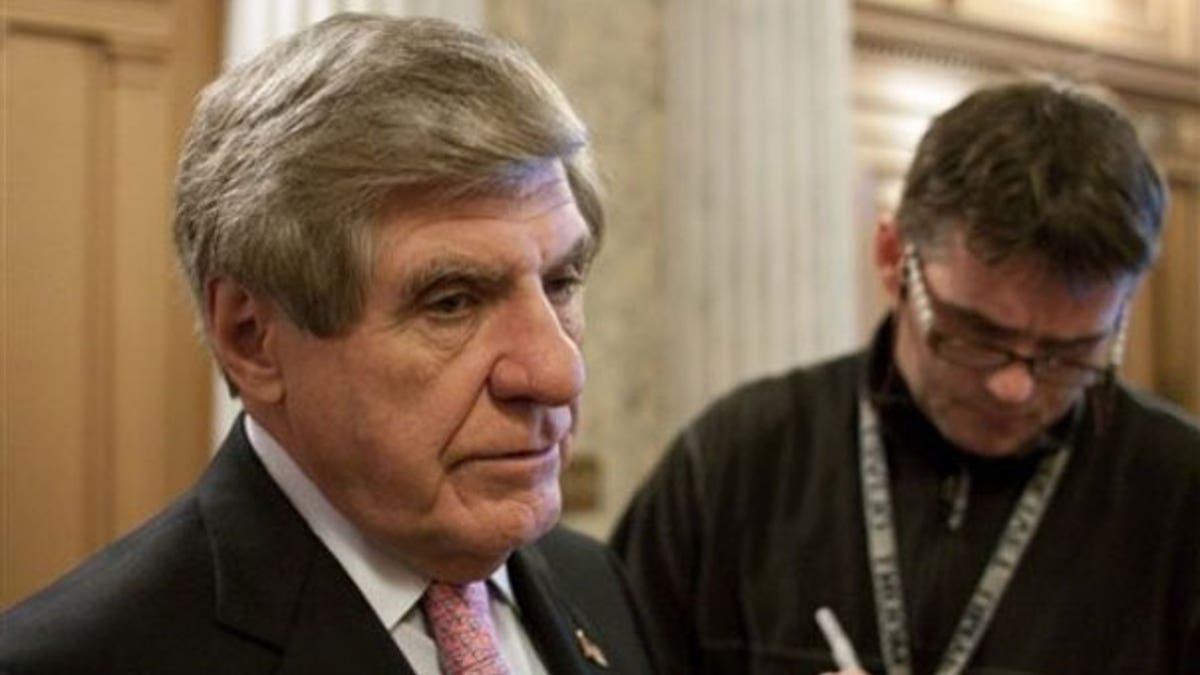
File: Sen. Ben Nelson talks to reporters in December 2009. (AP)
What started as Sen. Ben Nelson's personal stand against covering abortion with taxpayer money translated, somehow, into millions of dollars in federal aid for his home state.
The Nebraska Democrat, following weeks of negotiations with his caucus, finally agreed to back the Senate's health care reform bill this weekend after Democratic leaders made a series of concessions. Nelson's support gives Democrats the 60 votes they need to overcome a filibuster, barring any last-minute defections.
But critics by Sunday were heavily questioning Nelson's motivations, given that the abortion restrictions he sought and won did not satisfy several major anti-abortion lawmakers and groups and that it took a major federal payoff to his state to seal the deal.
Critics were calling it the "cornhusker kickback" and the "Nebraska windfall," lobbing accusations of political deal-making at Nelson.
"It's pretty obvious that votes have been bought," Sen. Saxby Chambliss, R-Ga., said.
Nelson did win restrictions on abortion coverage, which is what he sought for weeks. Under the compromise, states would be permitted to ban insurance coverage of abortions in policies sold in the exchanges, except in cases of rape, incest or when the life of the mother is in jeopardy. In states where such coverage is permitted, consumers must notify their insurance company they want it, and pay for it separately.
That didn't do much to please some anti-abortion lawmakers. But Nelson also won several other concessions, most notably a commitment from the federal government to fully fund his state's expanded Medicaid population. All states get full federal assistance for the first three years of the bill -- but Nebraska would be the only state getting full assistance afterward. One Democratic official put the cost to the federal government at $45 million over a decade.
Democratic senators defended the Nebraska deal. Sen. Kent Conrad, D-N.D., said all states get a lot of federal aid for Medicaid anyway, and that special treatment is hardly unique to Nebraska.
"Personally, every state gets some kind of differential treatment based on their situation," he told "Fox News Sunday."
"People fight for their own states. That's the nature of a democracy," said Sen. Amy Klobuchar, D-Minn.
But Sen. John McCain, R-Ariz., said Nelson's victory came at the expense of the other 49 states.
"That puts an added burden on all the other states, including mine," he said on "Fox News Sunday."
The concessions didn't end there. Nelson also got an exemption from a fee on non-profit health insurers -- the language was written in a way that only applies to Nebraska and Michigan.
Plus an extra tax on tanning was added, along with an increase in the Medicare payroll tax for those making more than $200,000.
The Nelson deal came shortly after Democratic leaders had to forego a government-run insurance plan, and a proposed expansion of Medicare eligibility, to win over Independent Connecticut Sen. Joe Lieberman.
McCain suggested the Obama administration wouldn't be in such a position if it had governed in a more bipartisan way.
"That's why they're in the position of having to purchase the last vote or two," McCain said.
Fox News' Trish Turner and The Associated Press contributed to this report.




